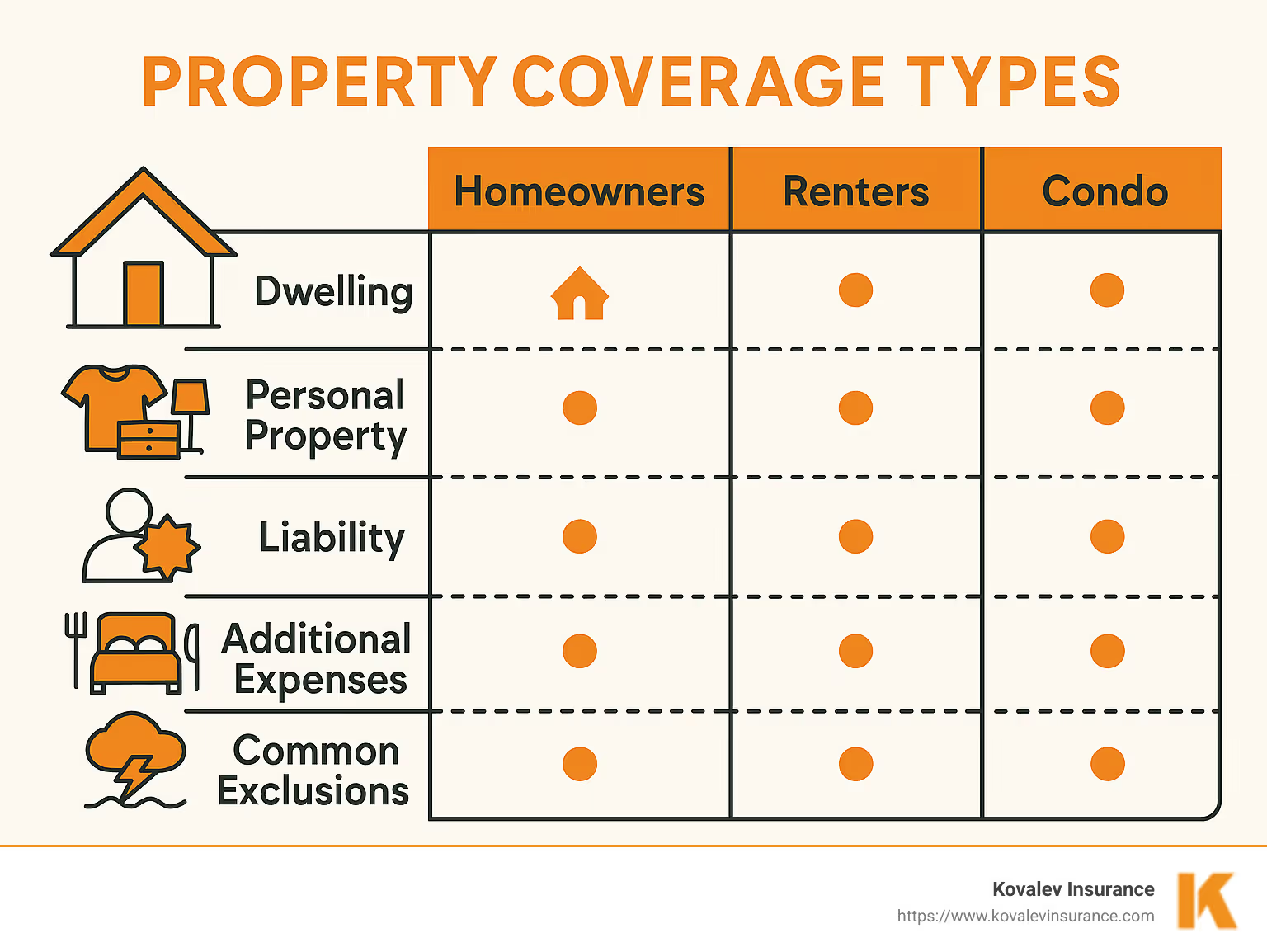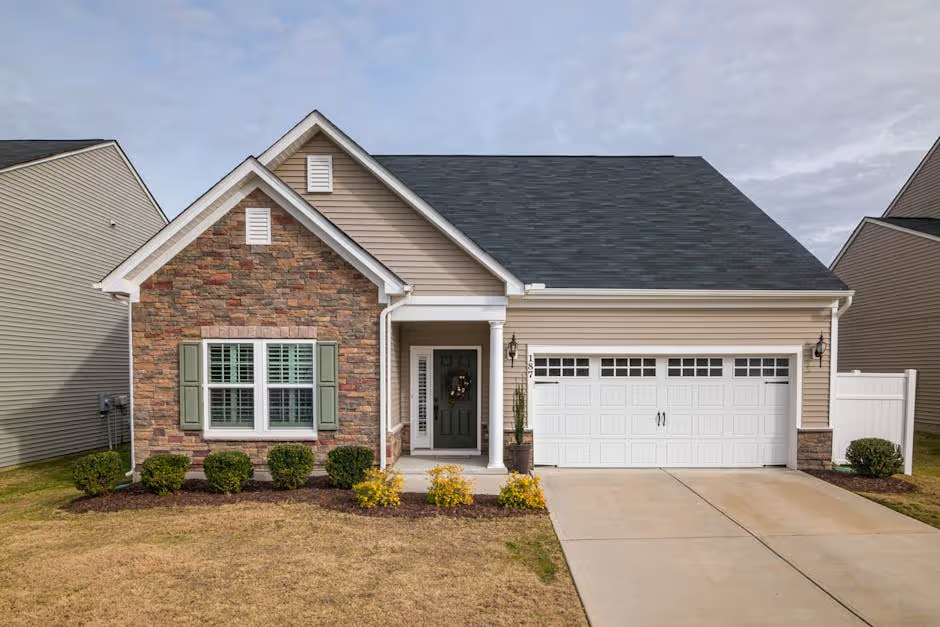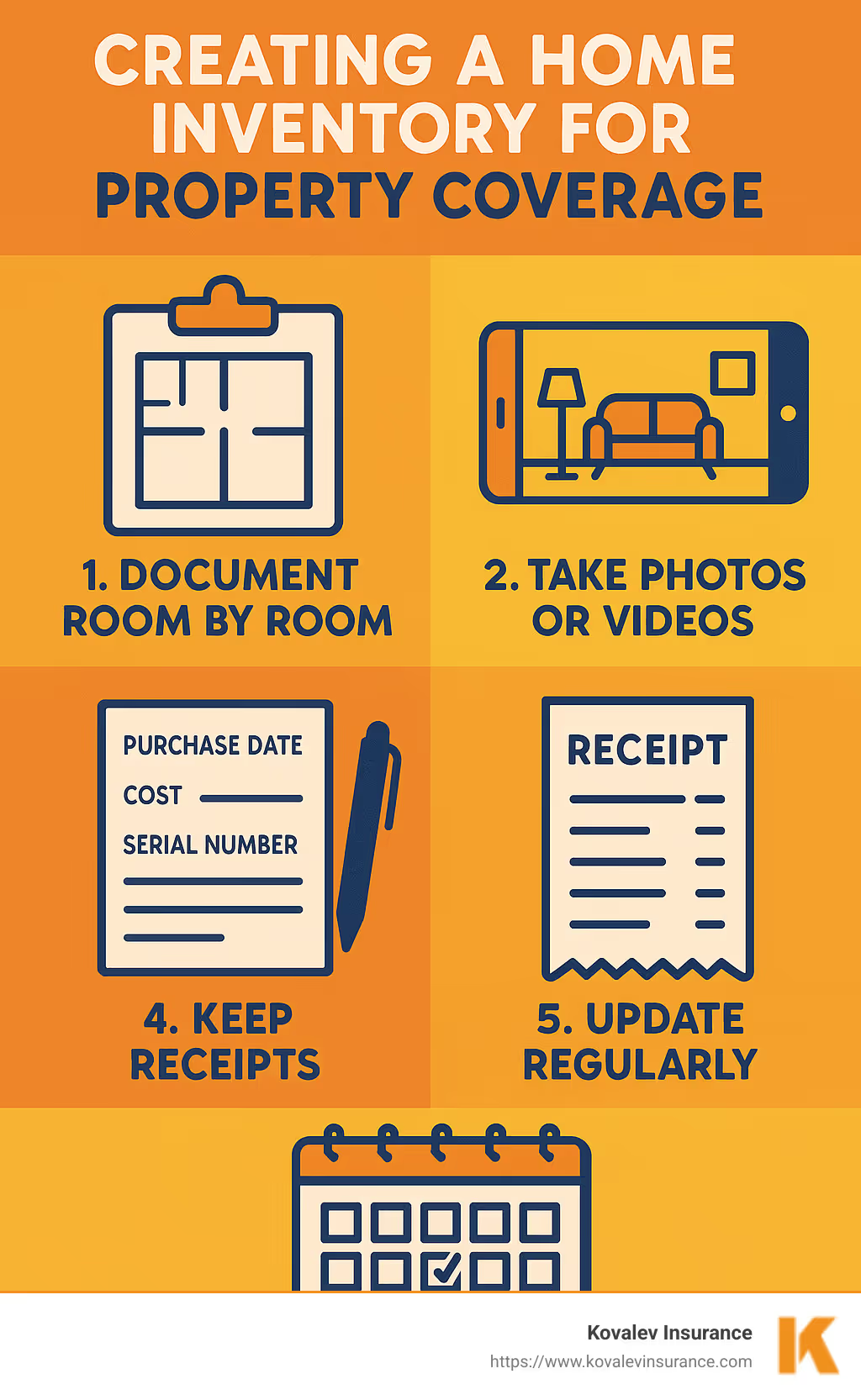Blog Content
12
Sep
2025

Property coverage is insurance that protects the physical assets you own against damage or loss due to covered perils like fire, theft, vandalism, and certain weather events. Understanding your coverage options is crucial for safeguarding your investments.
Property Coverage at a Glance:
Property coverage is more than just a policy—it's peace of mind. When unexpected events occur, having the right insurance prevents financial catastrophe and helps you recover quickly. In Massachusetts, where weather can range from nor'easters to summer storms, proper coverage is especially important for residents in Newton, Wellesley, Brookline, and surrounding communities.
Most standard policies don't cover everything. Flood damage, for example, typically requires separate coverage through the National Flood Insurance Program. Understanding these exclusions is essential to ensure you're fully protected.
I

Property coverage glossary:
Property coverage is the unsung hero in insurance, stepping in to protect your physical assets when the unexpected happens. But what does that mean for someone living in Massachusetts, whether you're a homeowner in Newton or a renter in Brookline?
At its heart, Massachusetts property coverage is about safeguarding what you own—both the building itself (if you own it) and the treasures inside. Imagine a winter storm sweeping through, causing a tree to crash onto your home in Needham. Without the right property coverage, you'd be stuck footing the bill for repairs, which could climb into the tens of thousands.
The importance of this coverage becomes crystal clear when you consider that the average claim for property damage in the U.S. is around $13,600. In a state like Massachusetts, where homes often carry a higher price tag, having adequate coverage isn't just wise—it's necessary.
Insurance professionals often suggest contemplating the cost of replacing everything you own. Every sweater, appliance, and spoon adds up quickly. Property coverage isn't just about fixing things—it's about ensuring you’re not left financially devastated when disaster strikes.
Without proper coverage, the risks can be significant. You could face a total financial loss of your home and belongings, cover out-of-pocket costs for temporary housing, handle personal liability for injuries on your property, or find yourself without financial recourse if your property is vandalized.
In Massachusetts, these risks are heightened by local factors such as nor'easters, heavy snowfalls, and older homes. Whether you're in Wellesley or Belmont, have coverage that accounts for these unique challenges.
When it comes to safeguarding your assets in Massachusetts, several types of property coverage are available, each uniquely designed to address specific needs and situations. Let’s dive into what these entail.
Homeowners insurance is the most comprehensive form of property coverage for those who own their residence. In the Bay State, the HO-3 (Special Form) policy reigns supreme. It covers your home's structure against all perils except those specifically excluded.
Standard homeowners policies in Massachusetts typically include several key coverages: Dwelling coverage protects the physical structure of your home, while other structures coverage looks after detached structures like garages, sheds, and fences. Your belongings are safeguarded under personal property coverage, and liability protection covers legal expenses if someone is injured on your property. If your home becomes uninhabitable, additional living expenses coverage kicks in to pay for temporary housing.
For residents in historic towns like Newton and Wellesley, specialized coverage options might be necessary to address the unique challenges of restoring older properties.
Renters insurance is a must for those leasing their homes. While your landlord's policy covers the building, it does not extend to your personal belongings. In Massachusetts, renters insurance typically costs around $148 per year—a small price for peace of mind. In areas like Brookline, where the average rent can exceed $2,500 per month, protecting your belongings with a policy that costs less than $15 a month is a savvy move.
Condo insurance is crafted specifically for condominium owners and works alongside the master policy held by your condo association. In growing communities like Belmont and Needham, understanding the division of coverage responsibility between your personal policy and the association's master policy is crucial.
For those renting out properties, landlord insurance offers essential property coverage for the building and any personal property used to service the rental, such as appliances. This specialized coverage often includes fair rental value coverage—which replaces lost rental income if your property becomes uninhabitable—and liability protection for legal expenses if a tenant or visitor is injured. Dwelling coverage also protects the physical structure of your rental property.
Standard property coverage policies do not cover flood damage, making separate flood insurance essential for many Massachusetts residents. According to FEMA, properties outside designated high-risk flood zones file over 20% of all National Flood Insurance Program claims. If you live in coastal areas or near rivers, flood insurance is particularly important.
For more detailed information about the costs associated with different types of property insurance in Massachusetts, don't miss our Mass Home Insurance Cost Insights.

Understanding the key components of property coverage policies is essential for ensuring you have adequate protection. Let's break down the main elements:
This is the cornerstone of property coverage for homeowners. It covers the physical structure of your home, including walls, roof, floors, built-in appliances, and attached structures like a garage or deck. For Massachusetts homeowners, especially in communities with higher property values like Newton and Wellesley, ensuring adequate dwelling coverage is crucial. The coverage limit should be based on rebuilding costs, not market value or purchase price.
This component of property coverage safeguards your belongings—furniture, clothing, electronics, kitchenware, and other personal items—if they're damaged, destroyed, or stolen due to a covered peril. In most Massachusetts policies, personal property coverage is typically set at 50-70% of your dwelling coverage. For a $500,000 home in Natick, that translates to $250,000-$350,000 in personal property protection. Certain categories of items have sub-limits, which we'll discuss in more detail later.
Although not strictly property coverage, liability protection is a standard component of homeowners, renters, and condo policies. It provides financial protection if someone is injured on your property and you're found legally responsible. For Massachusetts residents, especially in affluent communities like Wellesley and Newton, where the risk of high-value liability claims may be greater, considering higher liability limits or umbrella policies is advisable.
Also known as Additional Living Expenses (ALE), this property coverage component pays for temporary housing and additional costs if your home becomes uninhabitable due to a covered loss. For example, if a severe winter storm damages your Brookline home, making it uninhabitable, loss of use coverage would pay for hotel stays, increased food costs, and other reasonable expenses while repairs are being made. This coverage is typically limited to 20-30% of your dwelling coverage and for a specific time period, usually up to 12 months.
One of the most challenging aspects of property coverage is determining how much personal property protection you need. Many homeowners and renters in Massachusetts significantly underestimate the value of their belongings.
"If you were to lose everything in a fire, robbery, or other covered peril, it is helpful to have an updated and accurate home inventory," insurance experts advise. This statement highlights the importance of thoroughly documenting your possessions.
The first step in determining adequate property coverage for your personal belongings is creating a comprehensive home inventory:

For Massachusetts residents, especially those in communities with higher property values like Newton and Wellesley, a detailed inventory is particularly important. The average household in these communities often has personal property worth $250,000 or more.
Once you have a comprehensive inventory, you can better determine how much property coverage you need:
For example, a family in Needham with a 3-bedroom home might find they have over $200,000 in personal property—from furniture and clothing to electronics and kitchenware—far more than they initially estimated.
A critical aspect of property coverage that many policyholders overlook is sub-limits—caps on how much your insurance will pay for certain categories of items, regardless of your total personal property coverage limit.
Common categories with sub-limits in Massachusetts policies include:
For example, if you have a $10,000 engagement ring but your policy has a $1,500 jewelry sub-limit, you would only receive $1,500 if the ring were stolen—regardless of your total personal property coverage amount.
These sub-limits can significantly impact claims, especially for residents in affluent communities like Newton, Wellesley, and Brookline, where high-value items are more common.
For more information about average insurance costs and coverage in Massachusetts, see our guide on Average Homeowners Insurance Mass.
For items that exceed standard sub-limits, scheduled personal property coverage (sometimes called a "rider" or "endorsement") provides additional protection.
When should Massachusetts residents consider scheduled personal property coverage? Here are some common scenarios:
The process for scheduling items typically involves:
For example, a Natick resident with a $15,000 diamond ring would pay approximately $150-$200 annually to schedule this item, providing full coverage with no deductible—a small price for complete protection.
Scheduled items also typically receive broader coverage, often including mysterious disappearance (simply losing the item), which isn't covered under standard property coverage.
For more information about specialized coverage options, check out our guide on What Service Line Coverage Insurance.

One of the most important decisions when selecting property coverage is choosing between replacement cost and actual cash value coverage. This choice significantly impacts how much you'll receive if you need to file a claim.
Replacement cost coverage pays to replace your damaged property with new items of similar kind and quality, without deducting for depreciation. This is the more comprehensive option for property coverage.
For example, if your five-year-old refrigerator is damaged in a covered event:
For Massachusetts homeowners, especially in communities with higher-end homes like Newton and Wellesley, replacement cost coverage is strongly recommended. While it costs approximately 10-15% more in premiums, the additional protection is well worth the investment.
Actual cash value (ACV) coverage pays to replace your damaged property minus depreciation. This means you'll receive the current value of the item, accounting for age and wear and tear.
Using the same refrigerator example:
ACV coverage is less expensive but can leave you with significant out-of-pocket expenses when replacing damaged items.
The difference between these two valuation methods becomes particularly apparent during large claims. Consider this real-world example from a Brookline homeowner:
After a significant fire damaged much of their home and belongings, the difference between replacement cost and ACV coverage amounted to over $75,000. Items like electronics, furniture, and appliances had depreciated significantly, but the cost to replace them at current prices was much higher.
According to insurance industry data, claims settled with replacement cost coverage typically pay out 30-50% more than those with ACV coverage.
When deciding between replacement cost and ACV for your property coverage, consider:
For most Massachusetts residents, especially homeowners, replacement cost coverage provides the most comprehensive protection and peace of mind. As noted in Property Insurance: Definition and How Coverage Works, "While replacement cost coverage might have a higher premium, it ensures you receive enough to replace items with new ones, potentially avoiding out-of-pocket expenses if depreciation significantly reduces claim payouts under actual cash value coverage."
Understanding what your property coverage in Massachusetts doesn't include is just as crucial as knowing what it does cover. Standard policies come with a host of exclusions—situations or perils that aren’t covered. Let's explore these exclusions, especially those that impact Massachusetts residents.
In general, flood damage is a big one. Standard policies typically don't cover floods from rivers, lakes, or storm surges. This is particularly important for those living in coastal areas like Natick. Earthquake damage, while rare in Massachusetts, is also excluded.
But that’s not all. Normal wear and tear and maintenance issues? Not covered. So, if your roof is leaking because it’s old, don’t expect help from your insurer. Mold is often limited or excluded too. And if you have water backing up from sewers, you’ll likely need additional coverage. Pest infestations, intentional damage, business activities, nuclear hazards, war and terrorism, government action, power failures, and increased rebuilding costs due to new codes (known as ordinance or law) all fall under typical exclusions.
In Massachusetts, especially in older homes in Newton, Brookline, and Wellesley, understanding these exclusions is vital. For instance, while a standard policy might cover burst pipes due to freezing, it probably won't cover gradual water damage from ice dams.
Thankfully, many of these exclusions can be tackled with additional policies or endorsements. Flood insurance is a must for those near water or in flood-prone areas. Available through the National Flood Insurance Program, it provides crucial protection.
For the rare earthquake, earthquake insurance can be added as an endorsement. If you’re worried about water backing up from drains or sewers, check into water backup coverage. Those living in historic areas like Newton might consider ordinance or law coverage to help with the cost of meeting current building codes after a loss.
If your appliances have a habit of breaking down, equipment breakdown coverage might be a good fit, acting similarly to a home warranty. In addition to property, identity theft coverage is becoming increasingly popular. And if you run a business from home, home business coverage ensures your equipment and liability are covered.
At Kovalev Insurance a local independent insurance agency near you in Newton, we’ve seen how understanding these exclusions can prevent financial surprises. Many clients in Wellesley and Newton have been taken aback by gaps in their coverage. The key is to understand these exclusions before a loss occurs, ensuring you're never caught off guard.

When life throws you a curveball, and you need to file a claim on your property coverage, knowing what steps to take can make all the difference. Let's walk through the process of filing a property insurance claim, ensuring it's as smooth as a summer day in Massachusetts.
Before diving into the paperwork, make sure everyone is safe. If the situation calls for it, evacuate the area and call emergency services. Safety should always be your top priority. And if it's safe, turn off any utilities to prevent further damage.
Once everyone is safe, it's time to play detective. Document everything. Take photos and videos of all the damage before you even think about cleaning up. Make a detailed list of damaged items and hold onto them until the insurance adjuster gives the go-ahead. Don’t forget to save receipts for any emergency repairs or temporary housing you might need.
Reach out to your insurance company as soon as you can. Most insurers have 24/7 hotlines to handle claims. Keep your policy number handy and be ready to explain what happened. Ask them about the next steps and any timelines you should be aware of.
Getting the paperwork right is crucial. Fill out all required forms accurately and return them without delay. It's good practice to keep copies of everything you submit. If the insurer doesn’t get back to you within the expected timeframe, follow up.
An adjuster will likely visit to assess the damage. Be there if you can. Show them all the damage and provide your inventory of affected items. This is your chance to ask questions and understand the process, so take notes during the meeting.
For significant damage, you'll need to gather estimates. Get quotes from multiple licensed contractors. Ensure they’re detailed and cover all necessary repairs. Submit these to your insurance company, but wait for the claim approval before starting repairs.
If the settlement offer isn’t what you expected, don't be afraid to speak up. Clearly explain why you think it's insufficient and provide additional documentation if needed. If things get complicated, consider hiring a public adjuster. Always know your rights under Massachusetts insurance regulations.
Once the claim is approved, understand how and when the payments will be made. If you have a mortgage, be aware that your lender might be included on the claim checks. Keep meticulous records of all repair work, and if you find additional damage during repairs, let your insurer know.
Living in the Greater Boston area means keeping an eye on local factors. For weather-related claims, document the date and time of events. If winter damage occurs, record temperatures and conditions. Residents in historic towns like Newton or Brookline may need specialized restoration for their historic homes. Always ensure your repairs comply with local building codes.
For a deeper dive into navigating the insurance landscape in Massachusetts, check out our comprehensive guide on How to Buy Home Insurance in Mass.
By following these steps, you'll be well-prepared to tackle any bumps in the road with confidence, ensuring your property coverage works just as it should.
Sub-limits are a bit like the fine print in your property coverage policy. They put a cap on how much the insurance company will pay for certain categories of items, even if you have a hefty total coverage amount. So, imagine you have a policy with $200,000 in personal property coverage. If a thief makes off with your $5,000 engagement ring, but there’s a sub-limit of $1,500 for jewelry, you’re only getting $1,500. Ouch!
Typical sub-limit categories include jewelry and watches, cash and securities, electronics, firearms, business property, and fine art and collectibles. To make sure you’re not caught off guard, it’s smart to review your policy, create a detailed inventory of your belongings, and schedule valuable items if they exceed those pesky sub-limits. Regularly reassessing these items is also a good idea so you can update your coverage as values change. For folks in places like Newton and Wellesley, where high-value items are more common, managing sub-limits can really make a difference in your peace of mind.
The key difference between homeowners and renters insurance is what they cover. Homeowners insurance is like the full package—it covers your dwelling, other structures, all your personal property, liability, and additional living expenses. Renters insurance, on the other hand, skips the building coverage—it’s your landlord's job to worry about the walls and roof. So, it focuses on personal property, liability, and additional living expenses.
This difference shows up in the cost, too. In Massachusetts, the average homeowners insurance premium is about $1,500 a year, while renters insurance comes in at a wallet-friendly $148 a year. Even though renters insurance is cheaper, it provides similar protection for your belongings and liability. For renters in areas like Brookline, Cambridge, and Boston, where rents are high, this is a pretty sweet deal.
Got items that outshine the regular sub-limits? You might want to think about scheduled personal property coverage. This is like VIP protection for your engagement rings, fine jewelry, collectibles, fine art, high-end electronics, musical instruments, and even luxury watches.
The perks of scheduling these items are great: you get full coverage for their appraised value, usually with no deductible, and often enjoy broader protection that includes mysterious disappearances. Some policies even offer inflation protection so your coverage keeps up with increasing values.
For example, a client in Natick scheduled a $12,000 diamond ring for just $180 a year. That’s a small price for the peace of mind that comes with knowing these treasures are fully protected. For Massachusetts residents with valuable collections or heirlooms, this isn’t just a nice-to-have—it’s a must-have for proper protection.
Understanding property coverage is key to safeguarding your most valuable assets. Whether you're nestled in a historic Newton home, renting a cozy apartment in Brookline, or enjoying a condo in Wellesley, having the right insurance brings financial security and peace of mind.
Let's sum it all up:
First, it's crucial to assess your needs carefully. This means taking a thorough inventory of your property and knowing the true replacement value of your home and all its contents. Don't just guess—this is about making sure you're truly covered.
Next, dive into the details of your policy. Be aware of policy limitations like exclusions and sub-limits. These could leave you exposed when you least expect it.
When it comes to valuation, choosing the right method can make all the difference. For many Massachusetts residents, replacement cost coverage offers better protection than actual cash value. It's about getting enough to replace, not just repair.
Some risks demand extra attention. Address exclusions proactively by considering additional policies or endorsements, especially for perils like floods and earthquakes that standard policies often overlook.
And here's a pro tip: Document everything. A detailed home inventory with photos, videos, and receipts can make the claims process much smoother if disaster strikes. Trust us—your future self will thank you.
Regularly review your coverage. As your life changes, so do your insurance needs. An annual check-in ensures you're always adequately protected.
At Kovalev Insurance, we're not just insurance providers; we're your local experts who understand the unique challenges faced by our neighbors in Newton, Wellesley, Brookline, Needham, Belmont, Natick, and the Greater Boston area. We specialize in crafting personalized solutions that balance comprehensive protection with competitive rates.
Why wait for a loss to find out there are gaps in your coverage? Reach out to Kovalev Insurance today for a thorough review of your current policies and find options to improve your protection.
For more information on finding the best homeowners insurance in Massachusetts, check out our guide on More info about best homeowners insurance.
Property coverage isn’t just about finding the cheapest policy—it's about ensuring you have the right coverage to bounce back when the unexpected happens.
X